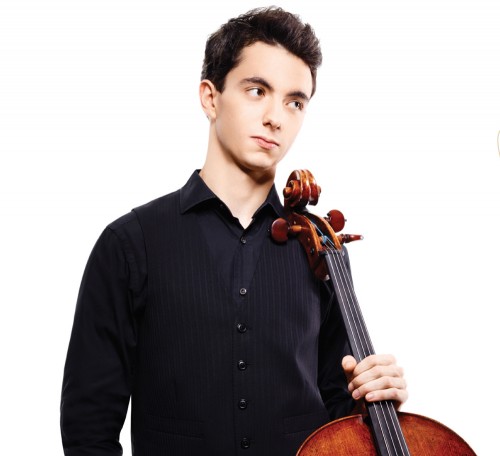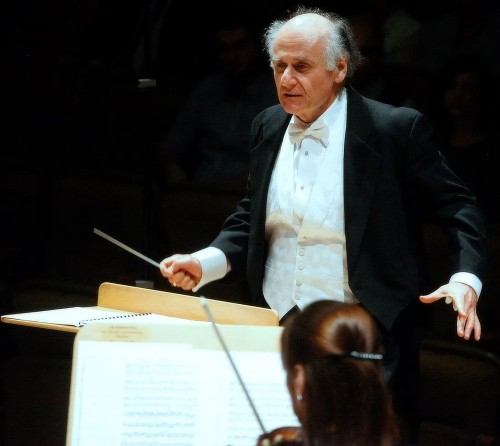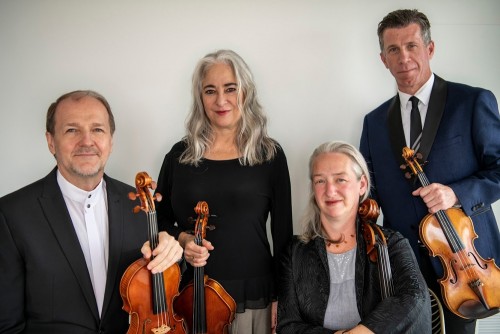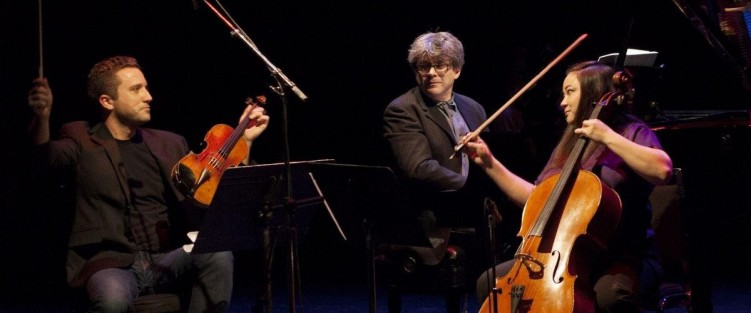 The sheer number of concerts in our listings is impressive enough. Even more impressive is the resonances between seemingly unrelated events once you start to dig a little deeper and start to connect the dots. Take, as an example, Art of Time and Sinfonia Toronto, mainstay ensembles in our midst for almost as long as The WholeNote has been around. Each is in the midst of a silver anniversary, 25th season with the founding artistic directors of both groups (Nurhan Arman and Andrew Burashko) still at the helm of their respective ensembles. Both of them delight in arranging music, and in creative programming, constantly seeking to blend the familiar with the new, introducing top-flight soloists to challenge their ensembles and delight their audiences.
The sheer number of concerts in our listings is impressive enough. Even more impressive is the resonances between seemingly unrelated events once you start to dig a little deeper and start to connect the dots. Take, as an example, Art of Time and Sinfonia Toronto, mainstay ensembles in our midst for almost as long as The WholeNote has been around. Each is in the midst of a silver anniversary, 25th season with the founding artistic directors of both groups (Nurhan Arman and Andrew Burashko) still at the helm of their respective ensembles. Both of them delight in arranging music, and in creative programming, constantly seeking to blend the familiar with the new, introducing top-flight soloists to challenge their ensembles and delight their audiences.
But this season the parallels have their limits. Art of Time has already announced that the season now underway – commencing with concerts on December 7 to 9 and culminating in May with a tribute to Joni Mitchell – will be their last. For Sinfonia Toronto, the season as announced, is business as usual,with two programs (on December 8 and January 26) falling within this WholeNote publication cycle, a further three programs in the new year, and, so far, no signs of slowing down.
Stéphane Tétreault
On December 8, Arman’s Sinfonia Toronto features cellist Stéphane Tétreault as the soloist in Robert Schumann’s only cello concerto. Chosen as the first ever Soloist-in-Residence of the Orchestre Métropolitain, the acclaimed cellist performed with Yannick Nézet-Séguin during the 2014-2015 season, made his debut in 2016 with the Philadelphia Orchestra under the direction of Nézet-Séguin, and performed at the Gstaad Menuhin Festival in Switzerland. During the 2017-2018 season, he took part in the Orchestre Métropolitain’s first European tour with Nézet-Séguin and made his debut with the London Philharmonic Orchestra. A noteworthy way to begin a career!
Arman calls Schumann’s writing in this cello concerto personal and lyrical rather than full of étude-like passages meant to display the soloist’s technical skill. Perhaps that was why the concerto was not received warmly in Schumann’s lifetime. Today it is loved for its great melodic beauty and the interpretive artistry it reveals in the cellists who perform it.
After the Schumann, Sinfonia Toronto will perform Corelli’s Concerto Grosso, Op.6, No.8, a masterpiece written for the night of Christmas and one of the composer’s most famous works.
Jocelyn Morlock’s Nostalgia opens the program and selections from Dvořák’s Valses and Slavonic Dances close it. Written in traditional Romantic style, the work is characterized by beautiful melodies, rich harmonies and expressive counterpoint.
The highlight of Sinfonia Toronto’s January 26 concert is Mozart’s Piano Concerto No.23, Op.488. The grandeur of its second movement – which filmmaker Terrence Malick wisely chose to support his 2005 film, The New World, with its unique take on the story of John Smith and Pocahantas – is unsurpassed. The third movement is a wily rondo, witty and sublime which will put Ukrainian-Canadian pianist and composer Dmitri Levkovich in the spotlight. Levkovich studied for 11 years with legendary Armenian pedagogue Sergei Babayan, who also mentored Daniil Trifonov.
Eighth and final Art of Time Holiday concert
The Art of Time’s December 7 to 9 concerts will be their eighth and final presentation of what has become an Art of Time holiday tradition, characterized, in their typically breezy fashion, as “our celebration of the holiday season with the joy and irreverence you have come to expect, featuring the best of the best taken from the last seven years.” Performers include Thom Allison, Jessica Mitchell, Jackie Richardson, Julian Richings, David Wall and Tom Wilson.
Orchestral Holiday Fare
Now that Home Alone has replaced It’s a Wonderful Life as the go-to-Christmas movie-of-choice, the holiday season has never been the same. The TSO invites all its fans to celebrate with them the return of Home Alone in Concert. Macaulay Culkin stars as a resourceful eight-year-old, accidentally left alone over Christmas, who repeatedly outsmarts a couple of bone-headed burglars. This beloved holiday film features renowned composer John Williams’ delightful score performed live-to-picture by the TSO in five screenings conducted by Constantine Kitsopoulos, December 7 to 9.
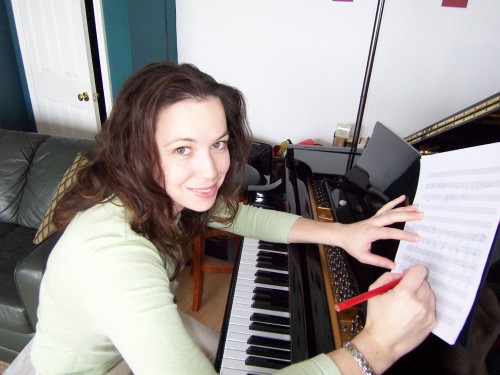 Down the QEW, the Hamilton Philharmonic Orchestra’s “Holidays & The Hockey Sweater” at 3pm on December 9 stands out. From Jesu, Joy of Man’s Desiring to Leroy Anderson’s Sleigh Ride, Abigail Richardson-Schulte’s musical treatment of Roch Carrier’s The Hockey Sweater and more, the repertoire makes for a promising afternoon.
Down the QEW, the Hamilton Philharmonic Orchestra’s “Holidays & The Hockey Sweater” at 3pm on December 9 stands out. From Jesu, Joy of Man’s Desiring to Leroy Anderson’s Sleigh Ride, Abigail Richardson-Schulte’s musical treatment of Roch Carrier’s The Hockey Sweater and more, the repertoire makes for a promising afternoon.
Also on December 9, up in Markham, in a Kindred Spirits Orchestra concert titled "The Greatest Show", Stravinsky’s Circus Polka, “For a Young Elephant”, composed as a short ballet production for the Ringling Bros. and Barnum and Bailey’s Greatest Show on Earth, kicks things off. Do not, however, expect the ballet to be performed, as the original was, by several young elephants in pink tutus. TSO concertmaster Jonathan Crow then takes centre stage to perform Bartók’s Violin Concerto No. 2, whose second movement – a theme and variations – is an early example of a theme employing all 12 tones of the chromatic scale. The grand finale, Bruckner’s Symphony No. 3, showcases a masterwork of virtuosic orchestral sound for conductor Kristian Alexander to unveil. The intermission features a conversation between Daniel Vnukowski and violinist Crow.
Kitchener-Waterloo
In late September, as reported by the CBC, the Grand Philharmonic Choir (GPC) in Waterloo region announced that it would honour, directly with the musicians from the former Kitchener-Waterloo Symphony (who found themselves out of a permanent gig after the KWS declared bankruptcy), the contracts the choir had inked for the season with the KWS.
The relationship between the Grand Philharmonic Choir and the KWS goes back 75 years, GPC artistic director Mark Vuorinen pointed out – in fact, the symphony was actually founded to accompany the choir in the great oratorios, and they have had a very symbiotic relationship over the decades. In the second concert of the GPC’s season, on December 9, the choir and KWS members will perform a rarely heard gem: Bach’s Christmas Oratorio, where the composer’s celebration of Christmas sparkles with joy and optimism.
A week later, on December 16, the Mississauga Symphonic Orchestra’s cheerful “Holiday. A Merry Little Christmas” kicks off at 7pm. Also on December 16, the Kitchener-Waterloo Chamber Music Society presents the Penderecki String Quartet celebrating another famous birth. It’s Beethoven’s birthday, and the Quartet will be playing two of the master’s finest: Op.18, No.6 and Op.131. The former can be seen as Beethoven’s goodbye to his youth, the latter is simply one of the greatest string quartets ever written. The Pendereckis have been marking this birthday for years and have just emerged from a period where they played all 16 string quartets. It will undoubtedly be a memorable recital.
Alliance and Verona String Quartets
Kicking off 2024 as we concluded 2023, two string quartet concerts caught my eye, for quite different reasons: the Verona String Quartet at Music Toronto on January 18, and the newly minted Alliance String Quartet, at Alliance Française Toronto, on January 19.
Verona: Mentored along their way by the Cleveland, Juilliard and Pacifica Quartets, and billed as “a string quartet for the 21st century,” the Verona Quartet, now quartet-in-residence at Ohio’s Oberlin Conservatory, “champions the rich breadth of the string quartet repertoire from the time-honoured canon through contemporary classics.”
Their concert here includes Puccini, Britten, Mozart and Verdi and is, somewhat cryptically, titled “All Roads Lead to Rome”. It’s certainly true of Verona itself (600 kilometres, but less than three hours from Rome by train), but also, in one way or another, it speaks to all the works on the program, each of which links to one or another Italian city. Puccini’s Crisantemi was written (in one night) in memory of his friend, the Duke of Aosta. Britten’s String Quartet No. 3 was drafted in Venice, late in his life (and draws on themes from his Death in Venice, composed two years earlier). Mozart’s String Quartet No. 3 is one of his six Milanese quartets, so named because he wrote them, age 16 and 17, during the year he spent in Milan working on his opera Lucio Silla. And Verdi’s String Quartet in E minor, the only surviving chamber work in his repertoire, was composed in 1873 in Naples, during a production of Aida. If the performance is as playful as the curation, we are in for a treat.
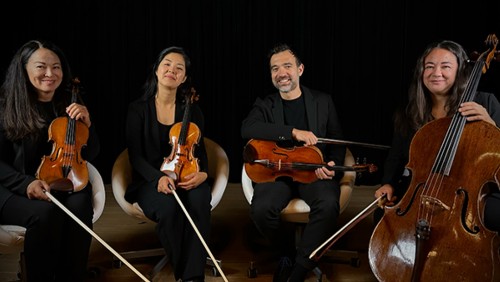 Alliance: The Alliance String Quartet comes to its name by happenstance as much as by design. “It was during the pandemic,” violinist Mayumi Seiler explained. “I decided to take the opportunity to advance my French language skills, so I went to Alliance Française Toronto on Spadina Road, becoming aware of the lovely little concert hall they have, and their performance series. I was hungry to perform with musicians I love and respect; Alliance Française was interested in having us perform, and we had to call it something – “Alliance” felt like a name that reflected the relationship with the venue, but even more so, the strong bond among us as musicians.”
Alliance: The Alliance String Quartet comes to its name by happenstance as much as by design. “It was during the pandemic,” violinist Mayumi Seiler explained. “I decided to take the opportunity to advance my French language skills, so I went to Alliance Française Toronto on Spadina Road, becoming aware of the lovely little concert hall they have, and their performance series. I was hungry to perform with musicians I love and respect; Alliance Française was interested in having us perform, and we had to call it something – “Alliance” felt like a name that reflected the relationship with the venue, but even more so, the strong bond among us as musicians.”
Cellist Rachel Mercer and Seiler go back the furthest, Seiler says. “I ran a chamber music series here for about 14 years, called Via Salzburg, starting in the late 1990s, and Rachel was from the very beginning our principal cellist; Min-Jeong Koh was once a student of mine and now we are colleagues at the Glenn Gould School; Rémi has been a fellow mentor at Toronto Summer Music, is a close friend, and a musician I admire. And his French is better than mine!"
January 19 is described on the AFT website as the “inaugural” concert of the Quartet, but Seiler is cautious. “The reality is that we are four established musicians with busy and complicated schedules who love and respect each other and are looking forward to making the most of this opportunity. And then …we’ll see."
Repertoire for the concert consists of the Ravel String Quartet, Beethoven’s String Quartet Op.18, No.6, and “a beautiful work for string quartet by Canadian composer Stefan Hintersteininger, titled The Growing Season.”
Paul Ennis is the managing editor of The WholeNote.


